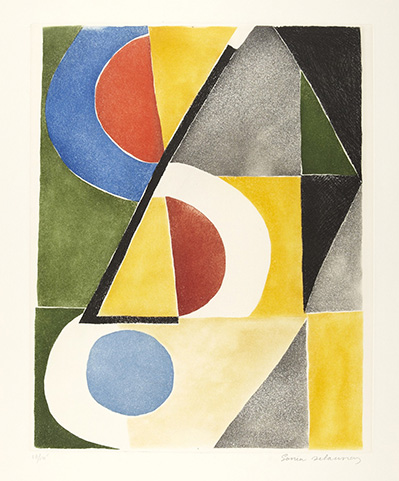프린스턴대 미술관 '여성 화가들과 추상(Women Artists and Abstraction)'
Women Artists and Abstraction
(from the museum collection)
Princeton University Art Museum (Princeton, NJ 08544)

Sonia Delaunay (French, born in Ukraine, 1885–1979), Untitled, ca. 1965, Etching and aquatint
This installation complements the Museum’s special exhibition Helen Frankenthaler Prints: Seven Types of Ambiguity (June 29–October 20). Women Artists and Abstraction features works on paper and photographs by women artists who contributed to the development of abstraction as a visual language from the postwar era to the present.
Photographs by Lotte Jacobi, Barbara Morgan, and Naomi Savage exemplify the artists’ shared interest in process experimentation and image manipulation. Jacobi’s Photogenics were produced by moving lights and torches over light-sensitive paper. Fueled by her passion for modern dance, Morgan used a similar process to capture the essence of ephemeral movements.
Experimentation with form and color is the driving force behind the tautly composed gouaches of Judith Rothschild, the rhythmic etching by Sonia Delaunay, and Alice Baber’s layered ink drawing, the latter made in response to the artist’s travel to Brazil. By contrast, monochromatic works by Sylvia Plimack Mangold, Agnes Martin, and Eve Aschheim focus on form using simple geometrical lines that draw attention to the picture plane.
Howardena Pindell’s conceptual collage employs ordinary hole punches—normally associated with office work and schools—which she then inscribed with numbers, shapes, and arrows to create “very small points of color and light” without having to rely on paintbrushes. Conversely, the delicate lines of poured ink in Dorothea Tanning’s lithograph and the energetic strokes in Susan Rothenberg’s etchings communicate a strong gestural language.
An equally complex exploration of gender identity informs Miriam Schapiro’s small watercolors as well as a more recent etching by Mona Hatoum. Schapiro used ovoid and anthropomorphic shapes—suggestive of fertility and creativity, as well as of growth and metamorphosis—to forge a female iconography. In her recent etching, Hatoum instead drew on a minimalist aesthetic to depict coiling tendrils of human hair, a specifically feminine material prominently featured in her work.
Annabelle Priestley, Curatorial Assistant
https://artmuseum.princeton.edu

*소니아 들로네이(Sonia Delaunay): 아방가르드 미술가, 생활디자인의 여왕 @바드대학원센터 갤러리
https://www.nyculturebeat.com/?mid=Art2&document_srl=4118029





